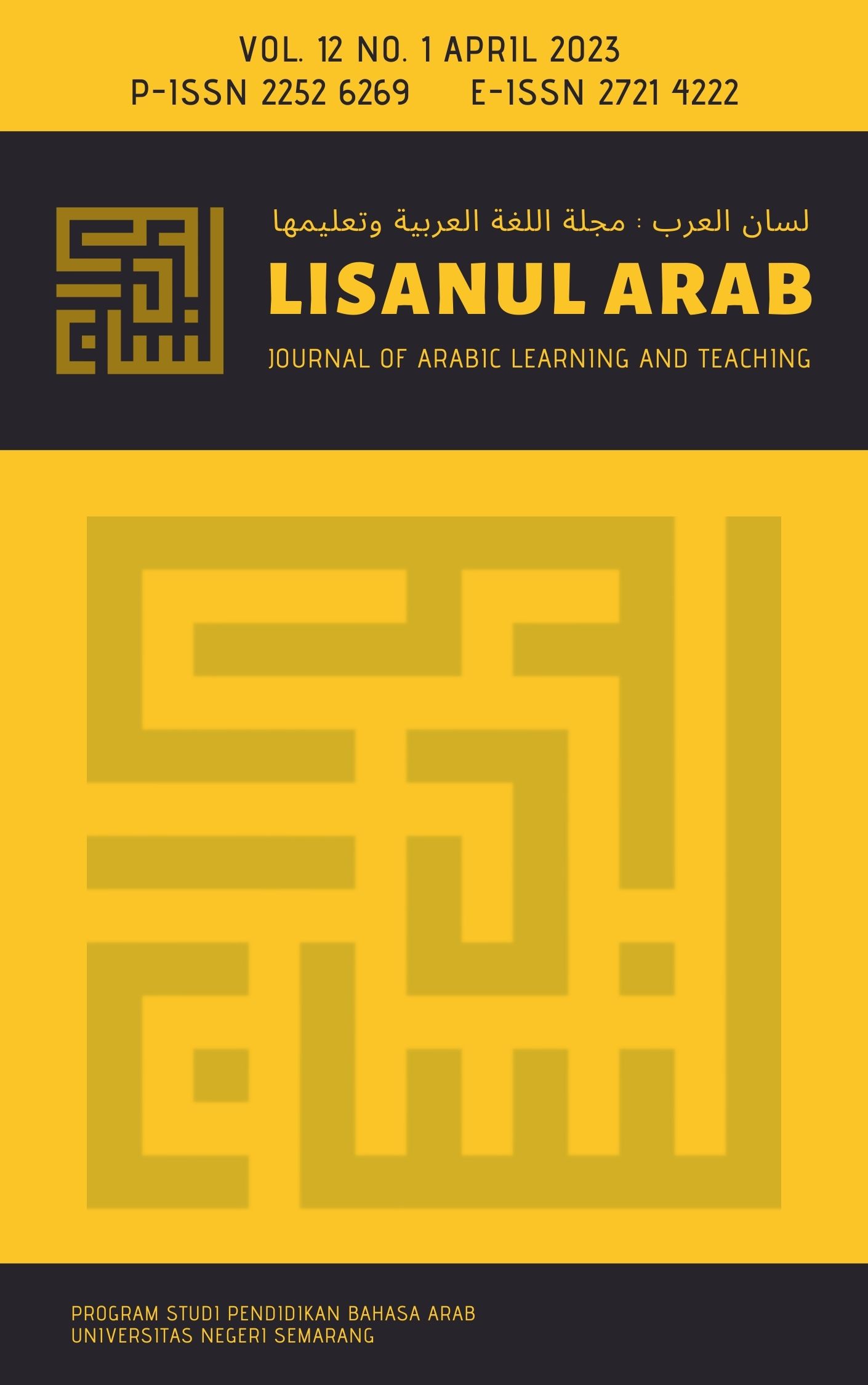E-KAMUS TEMATIK AJURUMIYAH : MODERNISASI KITAB TRADISIONAL UNTUK SANTRI MILENIAL AJURUMIYAH THEMATIC E-DICTIONARY: MODERNIZATION OF TRADITIONAL BOOKS FOR MILLENIAL STUDENTS Section Articles
##plugins.themes.academic_pro.article.main##
Abstract
This research is motivated by the difficulties of students in understanding the Ajurumiyah book, which is caused by ignorance of the meaning of the vocabulary or terms described in the Jurumiyah book. The limited time in teaching and learning activities at Madrasah Diniyah also affects the level of student's understanding, so the development of an e-dictionary based on an android application is needed to improve the understanding and learning motivation of millennial students. Therefore, the researcher offers a solution by developing a thematic e-dictionary for the vocabulary of the Ajurumiyah book for students of Madrasah Diniyah with the ADDIE model of R&D research design. This research shows that the needs for development of Ajurumiyah book are form of an application with an attractive design. This e-dictionary can be run on smartphones with the Android operating system without using an internet connection. the validation analysis by Expert and teacher about the product shows that this e-dictionary product is good and worth to use, with score 84.2.
##plugins.themes.academic_pro.article.details##
References
Fadli, C. (2015). Pembelajaran Bahasa Arab di Pondok Pesantren Modern dan Pesantren Tradisional ( Study Komparatif antara Pondok Pesantren As ’ ad dan Pondok Pesantren Sa ’ adatuddarain Kota Jambi ).
Fauziah, S. (2016). Penerapan Metode Card Sort Dalam Meningkatkan Hasil Belajar Kitab Jurumiyah Santri Di Pondok Pesantren Salafiyah Shofwatul ‘Ilmi Kota Tangerang. Journal of Modern African Studies, 35(17), 2104.
Gunawan, H., Suhartini, A., Nurshobah, A., & Rifa’i, I. (2018). Development of qawaid nahwiyah learning materials in the book of al-jurumiyah. Dialog, 41(2), 237–247.
Hermawan, A. (2013). Metodologi Pembelajaran Bahasa Arab. PT Remaja Rosdakarya.
Hijriyah, U. (2018). Analisis Pembelajaran Mufradat dan Struktur Bahasa Arab di Madrasah Ibtidaiyah.
Holilulloh, A. (2020). Pengaruh Mazhab Naḥwu Kū fah dalam Kitab Matn al- Ājurrūmīyah. 17(2), 139–148.
Komariyah, N. (2016). Pondok Pesantren Sebagai Role Model Pendidikan Berbasis Full Day School. Hikmah: Jurnal Pendidikan Islam, 5(2), 221–240.
Maulia, H. H., Sri, T., & Wulandari, H. (2018). Uji Validasi Pegembangan LKS (Lembar Kerja Siswa) Biologi SMA Berbasis Problem Based Learning pada Materi Perubahan Lingkungan untuk meningkatkan kemampuan berfikir kritis. Test Validation of the Development of LKS (Student Works Sheet) Based on Problem B. Proceeding Biology Education Conference, 15(1), 354–360.
Nafiah, H., & Afandi, A. (2018). Penyusunan Kamus Digital Ielts Berbasis Android. Prosiding Seminar Leksikografi Indonesia.
Novianti, N., Hasibuan, N. A., Al-ajurrumiyah, K., & Juno, E. (2018). Implementasi Algoritma Zhu Takaoka Pada Aplikasi Kitab Jurrumiyyah Berbasis Android. 2, 460–465.
Samsu. (2017). Metode Penelitian: (Teori dan Aplikasi Penelitian Kualitatif, Kuantitatif, Mixed Methods, serta Research & Development). Pusaka.
Setiyawan, A. (2016). Problematika Penggunaan Kamus Arab-Indonesia dalam Pembelajaran Tarjamah di Pusat Pengembangan Bahasa UIN Sunan Kalijaga Yogyakarta. Arabia, 8(1).
Sugiyono. (2019). Metode Penelitian Pendidikan: Pendekatan Kuantitatif, Kualitatif, R&D (Cetakan Ke 26). In Bandung: CV Alfabeta.
Tegeh, I Made, I Nyoman Jampel, dan K. P. (2014). Model Penelitian Pengembangan.
Tim Direktorat Jenderal Pendidikan Islam Kementerian Agama RI. (2018). Ensiklopedi Islam Nusantara (Issue Edisi Budaya). Kementrian Agama RI.
Tolinggi, S. O. R. (2020). Model Pembelajaran Bahasa Arab di Pesantren Salafiyah Syafi’yah Pohuwato dan Pesantren Hubolo Tapa. Al-Lisan: Jurnal Bahasa (e-Journal), 5, 64–95.
